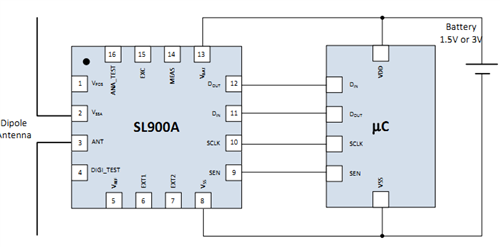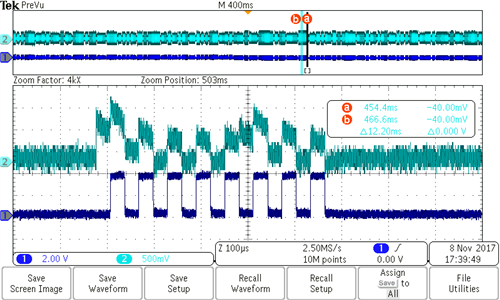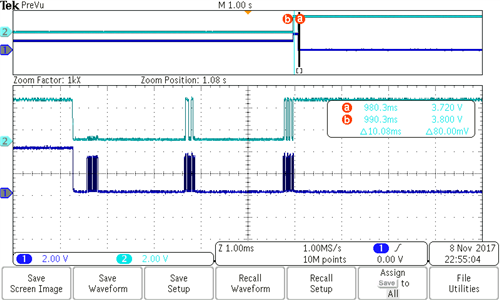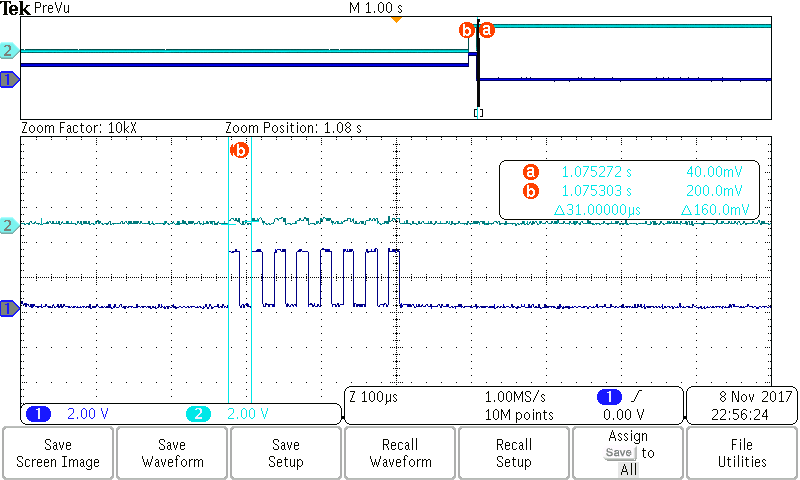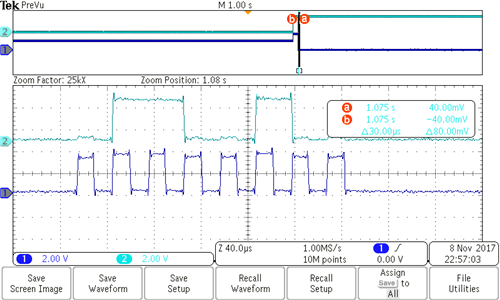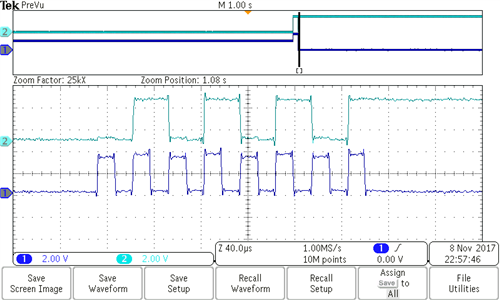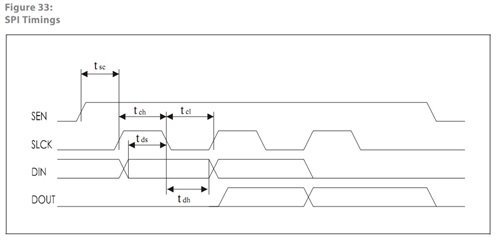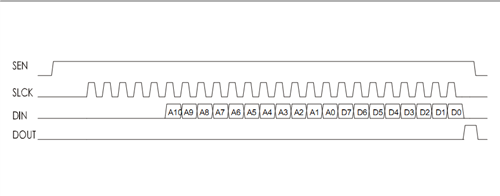Other Parts Discussed in Thread: MSP-EXP430FR5969,
Tool/software: Code Composer Studio
Dear all,
I'm testing SPI interface between MSP430 and the UHF RFID IC Tag SL900A. The problem is that: I cannot write/read data to/from SL900A. And there is a big problem regarding hardware. I don't know why. Please help me in this regard. Thank you so much.
1) Hardware setup:
* MSP430: I'm using MSP-EXP430FR5969. and eUSCI_A1 SPI module: P2.4: UCA1CLK (32 kHz); P2.5: UCA1SIMO; P2.6: UCA1SOMI; MCU operates with CLK = 1MHz
* SL900A: as below, except pin 2 is connected to pin 8 (recommended in page 3 datasheet). Battery is 2.5V (but MCU is connected directly to computer through USB, so 2 different Vcc for SL900A & MCU).
2) Coding:
#include <msp430.h>
volatile unsigned char RXData = 0;
volatile unsigned char TXData;
volatile unsigned char var=0;
volatile unsigned int count=0;
int main(void)
{
WDTCTL = WDTPW | WDTHOLD; // Stop watchdog timer
// Configure GPIO
P2SEL1 |= BIT4; // USCI_A1 operation
P2SEL1 |= BIT5 | BIT6; // USCI_A1 operation
PJSEL0 |= BIT4 | BIT5; // For XT1
P1DIR |= BIT4 + BIT0;
// Disable the GPIO power-on default high-impedance mode to activate
// previously configured port settings
PM5CTL0 &= ~LOCKLPM5;
// XT1 Setup
CSCTL0_H = CSKEY >> 8; // Unlock CS registers
CSCTL1 = DCOFSEL_0; // Set DCO to 1MHz
CSCTL2 = SELA__LFXTCLK | SELS__DCOCLK | SELM__DCOCLK;
CSCTL3 = DIVA__1 | DIVS__1 | DIVM__1; // set all dividers
CSCTL4 &= ~LFXTOFF;
do
{
CSCTL5 &= ~LFXTOFFG; // Clear XT1 fault flag
SFRIFG1 &= ~OFIFG;
}while (SFRIFG1&OFIFG); // Test oscillator fault flag
CSCTL0_H = 0; // Lock CS registers
// Configure USCI_A0 for SPI operation
UCA1CTLW0 = UCSWRST; // **Put state machine in reset**
UCA1CTLW0 |= UCMST | UCSYNC | UCMSB; // 3-pin, 8-bit SPI master, MSB first
// Clock polarity: data changed with first low-to-high transition of CLK
UCA1CTLW0 |= UCSSEL__ACLK; // ACLK
UCA1BR0 = 0x00; // fclk = 32kHz
UCA1BR1 = 0; //
UCA1MCTLW = 0; // No modulation
UCA1CTLW0 &= ~UCSWRST; // **Initialize USCI state machine**
//UCA1IE |= UCRXIE; // Enable USCI_A0 RX interrupt
P1OUT |= BIT4; // SEN is enabled
_delay_cycles(200);
while(1)
{
UCA1IE |= UCTXIE;
__bis_SR_register(LPM0_bits | GIE); // CPU off, enable interrupts
__delay_cycles(2000); // Delay before next transmission
P1OUT ^= BIT0;
}
}
#if defined(__TI_COMPILER_VERSION__) || defined(__IAR_SYSTEMS_ICC__)
#pragma vector=USCI_A1_VECTOR
__interrupt void USCI_A1_ISR(void)
#elif defined(__GNUC__)
void __attribute__ ((interrupt(USCI_A1_VECTOR))) USCI_A1_ISR (void)
#else
#error Compiler not supported!
#endif
{
switch(__even_in_range(UCA1IV, USCI_SPI_UCTXIFG))
{
case USCI_NONE: break;
case USCI_SPI_UCRXIFG:
RXData = UCA1RXBUF;
UCA1IFG &= ~UCRXIFG;
__bic_SR_register_on_exit(LPM0_bits); // Wake up to setup next TX
break;
case USCI_SPI_UCTXIFG:
count++;
if (var==0) {
TXData = 0;
UCA1TXBUF = TXData; // Transmit characters
var++;
}
else if (var ==1) {
TXData = 0x64;
UCA1TXBUF = TXData; // Transmit characters
var++;
}
else if (var == 2) {
TXData = 0x55;
UCA1TXBUF = TXData; // Transmit characters
var++;
}
UCA1IE &= ~UCTXIE;
__bic_SR_register_on_exit(LPM0_bits); // Wake up to setup next TX
break;
default: break;
}
}
3) Problems:
* Reading: when I tried to read data from FIFO (using Direct Command), I got only noise. Please see the pic below, when (1): SPI CLK, (2): P2.6 (UCA1SOMI). One more thing: I had to disconnect GND between SL900A and MCU. If their GNDs were connected, I got NO CLK (only spike instead of bit0-1).
* Writing: I tried to write data (0x55) into User's Memory of SL900A, started at addr of 0x064. These are 3 bytes I wrote to SL900A. But then, the data were all 0 when I read User Memory from reader (RFID interface).
(1): SPI CLK; (2): P2.5 (UCA1SIMO)
Byte 1: 0x00 (Write Command)
Byte 2: 0x64 (Address of SL900A EEPROM)
Byte 3: 0x55 (Data to be written)
I'm so confused. Please help me explain these things. Thank you so much.


